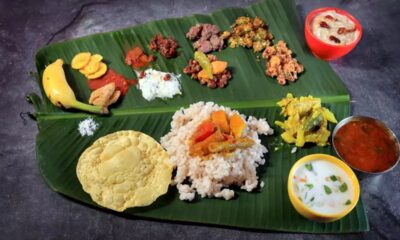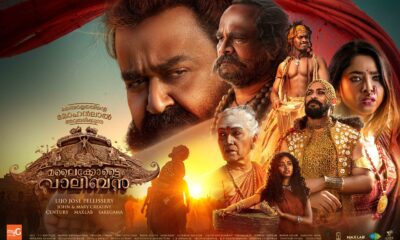Festivals
Celebrating Unity and Harvest: The Joyous Onam Festival

Every year, the vibrant state of Kerala in southern India comes alive with a burst of colors, feasts, and festivities as it celebrates the cherished Onam festival. Onam is not just a festival; it’s a celebration of heritage, unity, and the rich cultural tapestry of Kerala. With its origins steeped in mythology and agrarian traditions, Onam has evolved into a spectacular occasion that brings people together to rejoice in their shared history and the bounty of nature.
Mythological Roots and Significance
The story of Onam dates back to ancient Hindu mythology and centers around the legendary King Mahabali, a just and benevolent ruler who was believed to have ruled over Kerala. According to the myth, Mahabali’s reign was so prosperous and harmonious that it aroused the envy of the gods, including Lord Vishnu. In order to curb Mahabali’s power, Lord Vishnu took on the guise of a dwarf Brahmin, Vamana, and approached the king. Mahabali, known for his generosity, offered to grant Vamana any boon he desired.

Vamana then asked for a piece of land that could be covered in three strides. With his first step, he covered the entire Earth, and with his second step, he covered the skies. Realizing that he had no more space to take his third step, Mahabali offered his head as a landing place. In recognition of Mahabali’s unwavering devotion and sacrifice, Lord Vishnu granted him the boon of visiting his kingdom and people once a year, a celebration that marks the Onam festival.
The Ten-Day Extravaganza
Onam is typically celebrated over a span of ten days during the Malayalam month of Chingam (August-September), with the main day, known as Thiruvonam, falling on the last day. The festival is a colorful blend of cultural events, feasting, rituals, and decorations. Elaborate flower arrangements called “Pookalam” are created on the ground in intricate and vibrant patterns, with different varieties of flowers adding a riot of colors to homes and public spaces.
Feasting and Merriment
The heart of Onam lies in its sumptuous feasting. The traditional Onam Sadhya, a grand vegetarian banquet, is served on banana leaves and features an array of dishes, often numbering around 26. From the creamy coconut-based avial and spicy olan to the tangy mango pickle and crispy banana chips, every dish has a place of importance. The Sadhya is a testament to the rich culinary heritage of Kerala and the abundance of seasonal produce during the harvest season.
Onam Sadya, the culinary masterpiece of the Onam festival in Kerala, India, is a symphony of flavors that pays homage to the region’s rich cultural heritage. This grand vegetarian feast served on banana leaves, is a testament to the artistry of Kerala’s cuisine and the spirit of togetherness that defines the state.
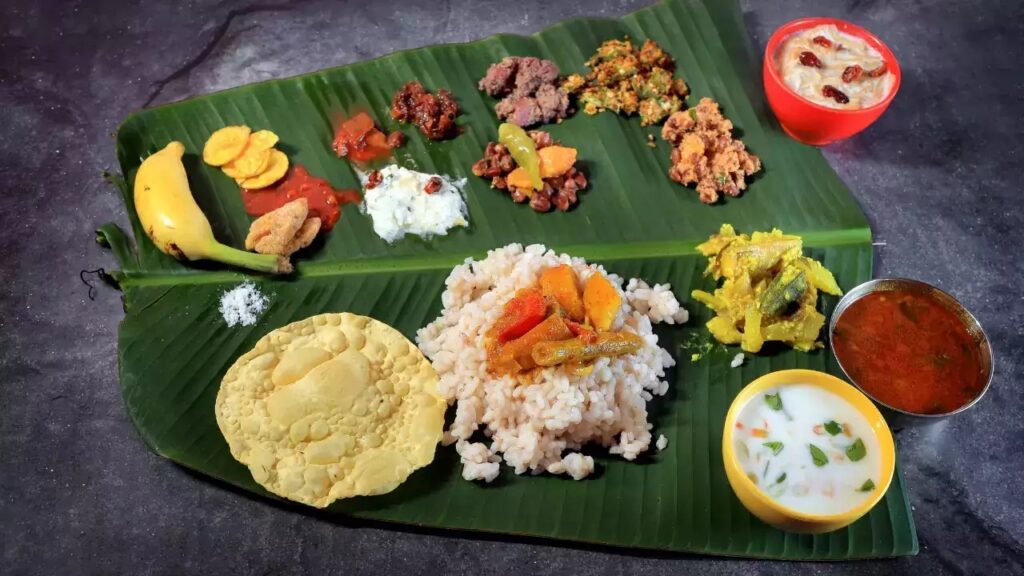
Comprising a plethora of dishes, the Sadya transforms a banana leaf into a canvas of vibrant colors and textures. From the tangy Sambar and aromatic Rasam to the creamy Avial and crispy Banana Chips, each item tells a story of tradition and community. The feast culminates with the delectable Payasam, a sweet pudding that symbolizes the sweet unity of the gathering.
More than just a meal, Onam Sadya is a ritual that binds families and communities, transcending barriers and fostering a sense of equality. It embodies the spirit of sharing, echoing the age-old sentiment of “Vasudhaiva Kutumbakam” – the world is one family.
Onam Sadya encapsulates the essence of Kerala’s culinary heritage and serves as a reminder that beyond the delightful flavors, food has the power to nourish not only the body but also the soul.
Vallamkali (Boat Races) and Folk Arts
Kerala’s iconic boat races, known as “Vallamkali,” are another integral part of Onam celebrations. Colorfully decorated longboats, or “Vallams,” are rowed with great enthusiasm along the backwaters and rivers of Kerala. The Nehru Trophy Boat Race in Alappuzha is one of the most famous and highly anticipated boat races, drawing crowds from all over.

Onam also showcases a plethora of traditional folk arts and performances like Kathakali (classical dance-drama), Pulikali (tiger dance), Kaikottikali (clap dance), and more. These performances not only entertain but also pay homage to Kerala’s rich artistic heritage.
Unity in Diversity
What makes Onam truly special is its ability to unite people from all walks of life. Regardless of religion, caste, or creed, Keralites come together to celebrate this festival with immense fervor. Onam transcends boundaries and acts as a reminder of the unity that can be fostered through shared cultural traditions.
Conclusion
Onam is more than just a festival; it’s a testament to Kerala’s deep-rooted cultural heritage, its reverence for nature, and its ability to celebrate diversity while nurturing unity. Through its mythology, rituals, feasting, and festivities, Onam brings to life the age-old values of harmony, generosity, and communal celebration. As the state of Kerala continues to uphold this tradition, it showcases the enduring power of culture to connect people and enrich their lives.
Festivals
Onam Sadya: A Culinary Extravaganza of Flavors and Traditions
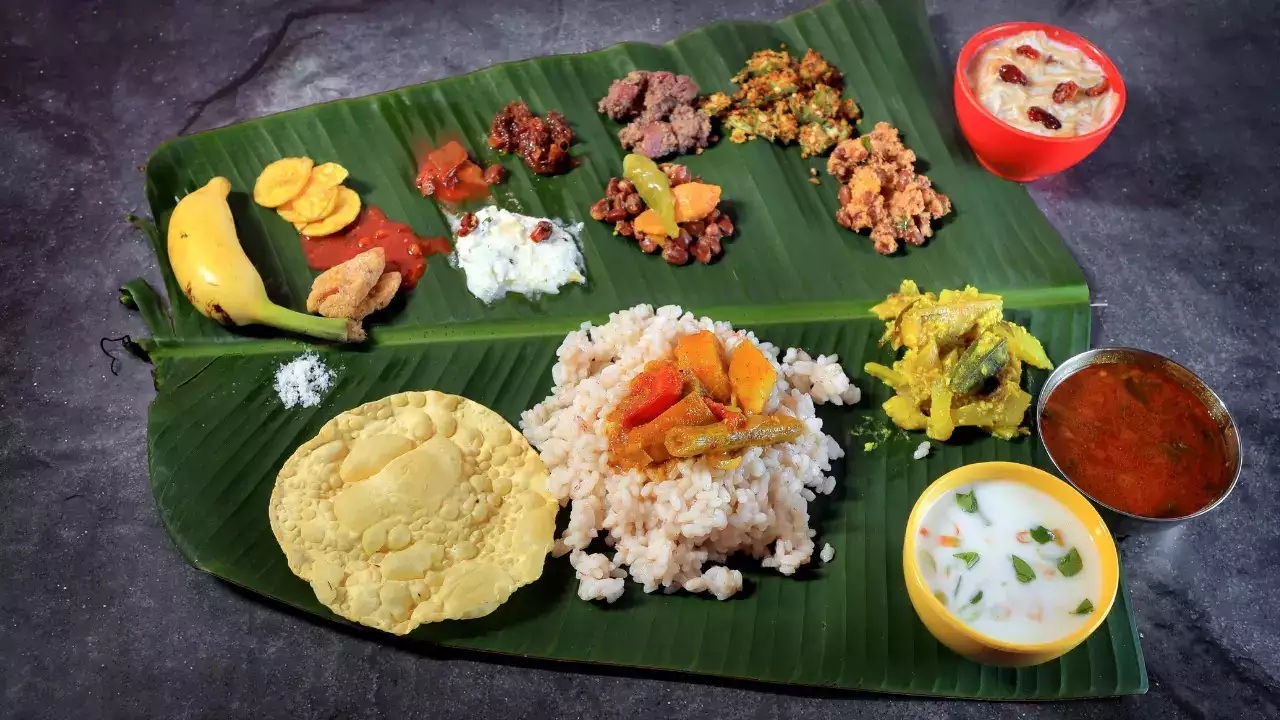
In the vibrant tapestry of Kerala’s culture, the Onam festival shines as a brilliant jewel, and at the heart of this celebration lies the illustrious Onam Sadya – a grand feast that not only tantalizes the taste buds but also reflects the rich culinary heritage and spirit of togetherness of the people of Kerala. The Onam Sadya is more than a meal; it’s a testament to the state’s love for food, community, and tradition.
A Feast Fit for a King
The word “Sadya” translates to “banquet” in Malayalam, and the Onam Sadya is truly fit for a king – reminiscent of the grand feasts that were once laid out for the legendary King Mahabali. Served traditionally on banana leaves, this elaborate spread boasts a harmonious blend of flavors, textures, and colors that encapsulate the essence of Kerala’s cuisine.
The Unforgettable Spread
A typical Onam Sadya consists of an impressive array of dishes, ranging from the tangy to the sweet, the mild to the spicy. While the number of dishes may vary, it is not uncommon for a traditional Sadya to comprise around 26 delectable items. Here are some key components that make the Sadya an unparalleled culinary experience:
- Rice: The meal begins with a serving of fresh, fragrant rice, which forms the base for the entire feast.
- Sambar and Rasam: These flavorful soups, made with a medley of spices and lentils, complement the rice beautifully.
- Avial: A medley of vegetables cooked in a coconut-based gravy, avial is a symbol of the bountiful harvest and the unity of different ingredients.
- Olan: This mild coconut milk stew features ash gourd and red gram (cowpeas) and is known for its simplicity and subtle flavors.
- Thorans: Various vegetable stir-fries, or thorans, offer a delightful crunch and a burst of color to the meal.
- Pachadi and Kichadi: These yogurt-based dishes – one sweet (pachadi) and one tangy (kichadi) – add contrasting flavors to the spread.
- Pickles: Spicy and tangy pickles made from mango, lime, or other fruits provide an extra kick of flavor.
- Banana Chips: Crispy, golden banana chips are a beloved accompaniment that add a satisfying crunch to the meal.
- Parippu (Dal): A simple lentil dish that adds protein and a comforting element to the feast.
- Payasam: The grand finale of the meal, payasam is a sweet pudding made with ingredients like rice, lentils, or vermicelli, sweetened with jaggery or sugar and enriched with milk and ghee.
The Spirit of Togetherness
What sets the Onam Sadya apart is not just its tantalizing flavors but also the spirit of community it embodies. Families and friends come together to partake in this feast, reinforcing bonds and creating cherished memories. The act of sharing a meal on a common banana leaf epitomizes equality and unity, regardless of social or economic distinctions.
Preserving Tradition
As Kerala continues to evolve, the Onam Sadya remains a steadfast link to its culinary heritage. The recipes and techniques passed down through generations are lovingly preserved, ensuring that each Sadya carries the flavors of the past into the present.
Conclusion
The Onam Sadya is a testament to the artistry of Kerala’s cuisine and the culture of togetherness that defines the state. With its intricate flavors, meticulous preparation, and warm communal spirit, the Sadya is not just a feast – it’s a celebration of life, unity, and the simple joy of sharing a meal with loved ones.
Entertainment
Attukal Pongala in Thiruvananthapuram today: Everything you need to know
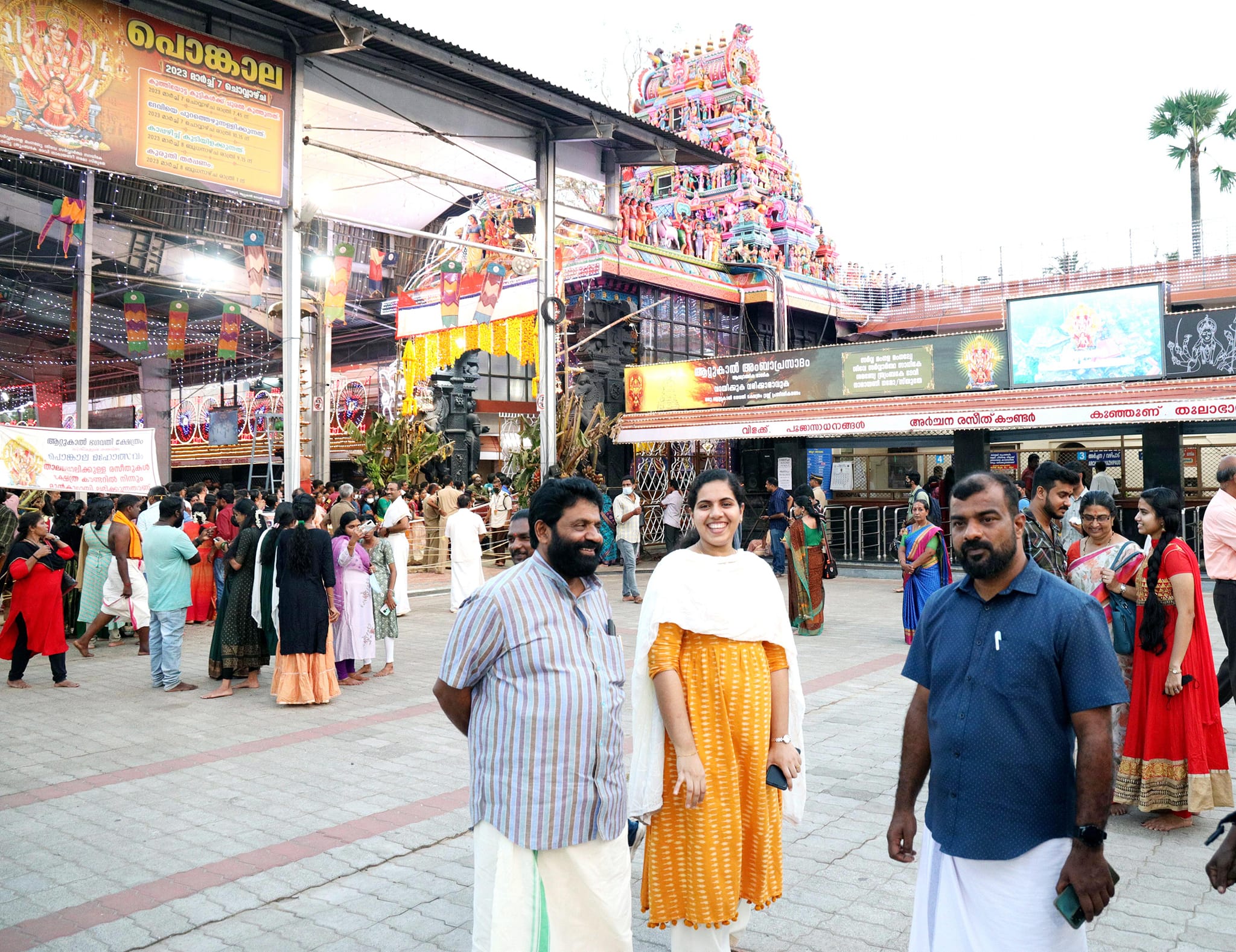
Attukal Pongala, popularly called Women’s Sabarimala is being held today after a long gap of 2 years. The devotees performed Attukal Pongala from their homes for the past 2 years due to the COVID-19 pandemic. With the reduction in COVID-19 cases, the Government of Kerala has decided to allow Attukal Pongala in full glory. The temple authorities started preparations three months back and devotees have started to arrive two days before the Pongala. There was a long rush of devotees to seek the blessings of Attukal Devi. Interestingly, Attutak Pongala falls one day before International Women’s Day on March 8.
Preparations
On Tuesday, the Attukal Pongala will see participation from thousands of women devotees representing various backgrounds. The city is already bustling with the arrival of pilgrims, travelers, and tourists, who have come to witness the grandeur of the festival.
After a two-year hiatus due to the COVID-19 pandemic, the festival is expected to draw an enormous crowd. Officials anticipate a 40% increase in the number of attendees. Last year, the Pongala festival was observed in a subdued fashion, confined to households. However, this year, the city streets are teeming with devotees. One can already spot bricks lining the footpaths of major roads leading to the temple, in preparation for the hearths to be set up.
Attukal Pongala Timings
The Attukal Pongala offering ceremony will commence at 10:30 am, with the temple’s head priest igniting the stove using fire from the temple’s sanctum sanctorum. The sanctification of the Pongala offerings with holy water (Nnivedyam) is scheduled for 2:30 pm. The ten-day festival will conclude on March 15. Even if you are not located in Thiruvananthapuram, you can perform Pongala from your home. You just need to follow the timings.

Food Safety Measures
A total of 725 organizations have received registration to conduct ‘Annadanam’ on the day of Pongala. In order to ensure food safety during the festival, five special squads have been deployed by the food safety authorities.
An official from the Food Safety department stated that they have instructed the ‘Annadanam’ organizers to avoid storing food for extended periods and to prepare it fresh for the devotees. They have also issued a strict warning to use only water supplied by the Kerala Water Authority (KWA). The official added that they are regularly collecting samples of raw materials and water to ensure the safety of the food being served.
The Food Safety official further stated that the sale of food items without proper labels has been banned, and an advisory has been issued to the devotees to avoid consuming such food items. Food safety helplines have been set up, and the numbers are as follows: 8943346181, 8943346582, 1800 425 1125, and 8943346526. The public is encouraged to reach out to these helplines if they have any concerns regarding food safety during the festival.
Apart from ensuring food safety, the Health Department has also made extensive arrangements to provide medical aid to the devotees. An official stated that approximately 30 ambulances would be stationed at various locations across the city to offer medical assistance to the devotees. “The district medical office has arranged for ten ambulances, and the Indian Medical Association (IMA) and private hospitals have agreed to provide an additional 20 ambulances on the day of Pongala,” the official added. This measure aims to ensure that medical aid is readily available to anyone who requires it during the festival.
Transportation Services
To facilitate the transportation of women devotees participating in the Pongala festival, the Kerala State Road Transport Corporation will operate special services from 11 key points in the city on Tuesday. This initiative aims to provide a smooth and hassle-free commute for the devotees.
In addition, the Indian Railways has also arranged for special services to ensure convenient transportation during the festival. A special train from Nagercoil Junction-Thiruvananthapuram Central has been scheduled to depart at 3:30 am and arrive at the capital at 5:30 am. This train will halt at various stations, including Nagercoil Town, Virani Alur, Eraniel, Palliyadi, Kuzithurai, Kuzithurai West, Parassala, Dhanuvachapuram, Amaravila, Neyyatinkara, Balaramapuram, and Nemom.
Two more trains, the Ananthapuri Daily Express (16824) originating from Kollam and the Kanyakumari-Punalur daily, will also be available to augment transportation services during the festival. These trains will stop at all stations along the way.
Cleaning after Attukal Pongala
After the Attukal Pongala festival, around 2,200 sanitation workers will be deployed for the post-festival cleanup in Thiruvananthapuram. These workers will work towards ensuring that the entire city is cleaned up within a few hours following the event. This initiative aims to maintain the cleanliness and hygiene of the city while also ensuring a safe and healthy environment for its residents.
Festivals
Sabarimala Makaravilakku Festival: How to watch

The much-awaited Sabarimala Makaravilaku festival has started and will culminate with the appearance of the Makarjyothi on the hills. The Jewels from the Pandalam Palace also called Thiruvabharanam will be brought to the temple premises and taken inside the sanctum santorum. The Makar Jyothi will light up soon after that between 6.30 PM to 6.45 PM.
You can watch the Sabarimala Makaravilakku festival live on all Malayalam, Tamil channels including DD Malayalam and DD Podhigai. The Jaya TV will broadcast the entire proceedings starting 5 PM.
The Malayalam channels will start the festival only at 6.30 PM after finishing up all the latest news. The live commentary will be impressive and you can watch each and every movement inside Sabarimala temple. Sabarimala is situated in Pathanamthitta district, Kerala on the banks of the Pamba river. The pilgrims include the majority from Tamil Nadu, Karnataka, and Andhra Pradesh including Kerala. The Sabarimala prasadam includes the famous Aravana Payasam, Appam and others.
-

 Entertainment7 years ago
Entertainment7 years agoMalayam Actor Dileep Denied Bail In The Actress Assault Case
-

 Entertainment7 years ago
Entertainment7 years agoPuthiya Thalaimurai News Readers – Pictures
-

 Politics5 years ago
Politics5 years agoHowdyModi: Everything you want to know
-

 Entertainment7 years ago
Entertainment7 years agoAparna Balamurali Looks Beautiful In Sarvopari Palakkaran
-

 Entertainment8 years ago
Entertainment8 years agoVishu Celebrations – Suresh Gopi [Images]
-

 Entertainment8 years ago
Entertainment8 years agoHOT: Mollywood’s Most Romantic and Sensuous Lip-Lock Scenes
-

 Entertainment5 years ago
Entertainment5 years agoKaappaan Movie Reviews: Blockbluster or Flop
-

 Entertainment8 years ago
Entertainment8 years agoSaghavu – Madhumathiye Official Video Song – Nivin Pauly and Aishwarya Rajesh

